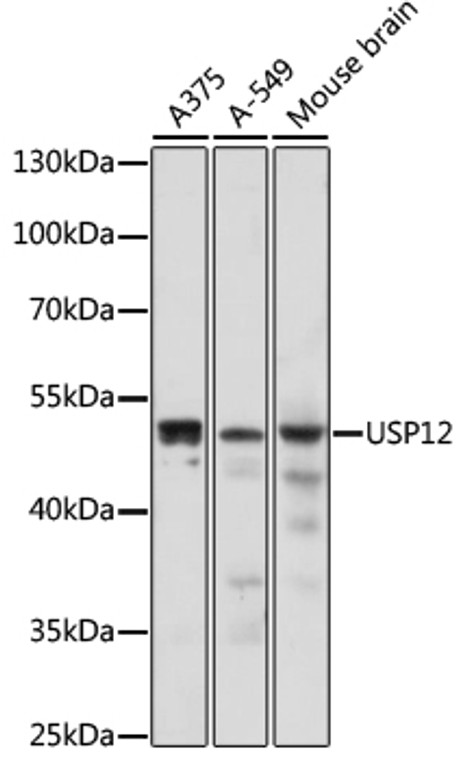| Host: |
Rabbit |
| Applications: |
WB |
| Reactivity: |
Human/Mouse/Rat |
| Note: |
STRICTLY FOR FURTHER SCIENTIFIC RESEARCH USE ONLY (RUO). MUST NOT TO BE USED IN DIAGNOSTIC OR THERAPEUTIC APPLICATIONS. |
| Short Description: |
Rabbit polyclonal antibody anti-USP12 (1-100) is suitable for use in Western Blot research applications. |
| Clonality: |
Polyclonal |
| Conjugation: |
Unconjugated |
| Isotype: |
IgG |
| Formulation: |
PBS with 0.01% Thimerosal, 50% Glycerol, pH7.3. |
| Purification: |
Affinity purification |
| Dilution Range: |
WB 1:500-1:1000 |
| Storage Instruction: |
Store at-20°C for up to 1 year from the date of receipt, and avoid repeat freeze-thaw cycles. |
| Gene Symbol: |
USP12 |
| Gene ID: |
219333 |
| Uniprot ID: |
UBP12_HUMAN |
| Immunogen Region: |
1-100 |
| Immunogen: |
A synthetic peptide corresponding to a sequence within amino acids 1-100 of human USP12 (NP_872294.2). |
| Immunogen Sequence: |
MEILMTVSKFASICTMGANA SALEKEIGPEQFPVNEHYFG LVNFGNTCYCNSVLQALYFC RPFREKVLAYKSQPRKKESL LTCLADLFHSIATQKKKVGV |
| Function | Deubiquitinating enzyme that plays various roles in the regulation of the immune response and inflammation. In complex with WDR48, acts as a potential tumor suppressor by positively regulating PHLPP1 stability. During TCR engagement and activation, translocates into the cytoplasm and deubiquitinates its substrates LAT and TRAT1 and prevents their lysosome-dependent degradation to stabilize the TCR signaling complex at the plasma membrane. Plays an essential role in the selective LPS-induced macrophage response through the activation of NF-kappa-B pathway. In addition, promotes that antiviral immune response through targeting DNA sensor IFI16 to inhibit its proteasome-dependent degradation. Participates in the interferon signaling pathway and antiviral response independently of its deubiquitinase activity by maintaining nuclear phosphorylated STAT1 levels via inhibition of its CREBBP-mediated acetylation and subsequent dephosphorylation. Plays an intrinsic role in promoting the differentiation, activation and proliferation of CD4(+) T-cell by activating the NF-kappa-B signaling pathway through deubiquitinating and stabilizing B-cell lymphoma/leukemia 10/BCL10. In myeloid-derived suppressor cells promotes the activation of the NF-kappa-B via deubiquitination and stabilization of RELA. Regulates the 'Lys-63'-linked polyubiquitin chains of BAX and thereby modulates the mitochondrial apoptotic process. (Microbial infection) Forms a complex with Epstein-Barr virus protein EBNA3 which is an active deubiquitinase activity that may select specific substrates to promote B-lymphocyte transformation. |
| Protein Name | Ubiquitin Carboxyl-Terminal Hydrolase 12Deubiquitinating Enzyme 12Ubiquitin Thioesterase 12Ubiquitin-Hydrolyzing Enzyme 1Ubiquitin-Specific-Processing Protease 12 |
| Database Links | Reactome: R-HSA-5689880 |
| Cellular Localisation | NucleusCytoplasmCell MembraneTranslocates From The Nucleus To The Cytosol On Tcr StimulationWhile It Translocates Into The Nucleus In Ifn Signaling |
| Alternative Antibody Names | Anti-Ubiquitin Carboxyl-Terminal Hydrolase 12 antibodyAnti-Deubiquitinating Enzyme 12 antibodyAnti-Ubiquitin Thioesterase 12 antibodyAnti-Ubiquitin-Hydrolyzing Enzyme 1 antibodyAnti-Ubiquitin-Specific-Processing Protease 12 antibodyAnti-USP12 antibodyAnti-UBH1 antibodyAnti-USP12L1 antibody |
Information sourced from Uniprot.org
12 months for antibodies. 6 months for ELISA Kits. Please see website T&Cs for further guidance






